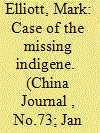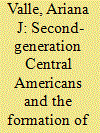| Srl | Item |
| 1 |
ID:
144379


|
|
|
|
|
| Summary/Abstract |
The last few years have seen a vigorous public policy debate emerge over a “second-generation” ethnic policy (di’erdai minzu zhengce) which, if implemented, would constitute a major revision of ethnic politics in China. Despite the fact that nationalities policy is a notoriously sensitive subject within China, the debate is happening openly in newspapers, academic journals and on the Internet. The prominence accorded to anthropological theory and international comparison is a notable feature of the debate. This article first explores the main positions in the ongoing policy discussion, then goes on to argue that, rather than comparing China’s non-Han peoples to minority immigrant populations in the industrialized democracies, a better comparison is to indigenous peoples. It then considers why this perspective is completely missing from the present debate.
|
|
|
|
|
|
|
|
|
|
|
|
|
|
|
|
| 2 |
ID:
171066


|
|
|
|
|
| Summary/Abstract |
Whether Latinos in the United States are an ethnic or racial group is extensively debated. Some propose Latinos are an ethnic group on their way to becoming white, others contend Latinos are a racialised group, and an alternate perspective posits Latinos are an ethnoracial group. This study intervenes in this debate by examining the identities of second- and 1.5-generation Central Americans in Los Angeles, California. Drawing on 27 in-depth interviews, I show Central Americans have an identity repertoire, which includes national origin, panethnic, racial, and minority identities. I also capture the situations and reference groups that influence the deployment of ethnic and racial identities. These results suggest Central Americans develop an ethnoracial identity. I argue Central Americans’ ethnoracial identity emerges from agency – subjective understandings of themselves and resisting invisibility in Mexican Los Angeles – and from structure – a racialised society, institutionally-created panethnic categories, and racially-based experiences.
|
|
|
|
|
|
|
|
|
|
|
|
|
|
|
|
| 3 |
ID:
160378


|
|
|
|
|
| Summary/Abstract |
This article analyses how second-generation Moroccan women are integrating new ways of understanding Islam and morality into their everyday. The study is based on ethnographic research and on the life stories of young Moroccan women who attend Spanish universities. The author explores the concerns that these students share in a context in which being a Muslim woman can lead to situations of inequality and discrimination within their own intragroup, namely their families and members of the Moroccan community, as well as the non-Muslim members of Spanish society. The study reveals how the participation of these women in higher education promotes the appropriation of a discourse related to Islamic feminism. As a result of this appropriation they are able to negotiate new interpretations of religious practice and meanings of moral norms, which they integrate into their everyday world. From this perspective the study reveals the way that these young women try to construct a more inclusive identity as Muslim women living in Spain.
|
|
|
|
|
|
|
|
|
|
|
|
|
|
|
|
| 4 |
ID:
169044


|
|
|
|
|
| Summary/Abstract |
This article explores the ‘return’ migration of high-skilled, second-generation Indian-Americans from the United States to India. Based on interviews with fifty-six respondents, it asks: What transnational ties do second-generation Indian Americans maintain with India prior to return? Upon return, what are their ‘reverse’ transnational linkages to the United States? How do these linkages shape their ethnic identities, if at all? Findings suggest that respondents’ transnational ties to India prior to return reinforce their identities as Indian Americans. Once in India, they maintain affective and civic ties to the United States, the country where they were born or raised. Further, American-inflected social ideas and norms shape returnees’ interactions with domestic workers in India. As they grapple with the disparities between Western and Indian norms on the treatment of domestic help, respondents privilege ‘American’ identities. These findings highlight the transnational ties and identity construction and negotiation of second-generation returnees.
|
|
|
|
|
|
|
|
|
|
|
|
|
|
|
|